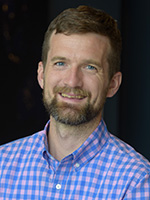
Director's Message

CTS Director
Earlier this summer, I had the opportunity to chat with a group of high school students who were exploring possible careers in transportation. In describing the work of the Center for Transportation Studies, I told them our work at the University of Minnesota boiled down to helping shape the future of transportation. So much so that we made it our theme for 2023—highlighting key ideas through 18 forward-looking articles and numerous supporting webinars, presentations, and programs. These ideas are what U of M researchers and national experts see as the next big steps or key challenges in our transportation future.
I explained to the students that CTS and University partners shape the future of transportation through multiple avenues. We do it by engaging with students across the U of M system and with high schoolers like themselves. I talked to them about how this effort is reflected in our partnerships and professional training programs with public agencies, industry partners, and communities. Finally, I highlighted the efforts of U researchers working on a range of topics—from foundational new technologies and materials to better understanding how to improve the ways people move through their daily lives.
This year we used our theme as a focal point around which we could build up programming that contributed to our efforts to build a transportation system that is sustainable, serves the needs of all users, supports a strong economy, and improves our collective quality of life.
Universities are workshops for innovation—and a space to impart the lessons of that exploration—to students and broader audiences. CTS has always kept an eye on how our daily efforts accumulate to help build the transportation systems and practices of the future. In this year’s impacts report, you’ll see evidence of that focus in every research link and performance measure highlight.
We are also delighted that this year we’ve secured multiple new avenues for pursuing such work and supporting innovative transportation interventions. We successfully joined the Center for Connected and Autonomous Vehicles, a university transportation center funded by USDOT and led by the University of Michigan. This partnership will expand the work and impact of our MnCAV Ecosystem.
We also successfully competed to lead a new Federal Transit Administration program called the Mobility, Access, and Transportation Insecurity demonstration program. Through this project, we’ll work with communities across the country to develop and implement innovative pilot projects, and we will evaluate the successes of each through rigorous research. We also continued our close partnership with the Minnesota Legislature and will be working on multiple priorities from the previous session, including new funding to support project development and ideation of small communities.
In talking with the students, I was also struck by the fact that the reason they were together—to learn about potential career paths in transportation—reflected a common throughline in much of our work of the past year. Amid major investments in infrastructure and with the new normal of post-pandemic activity settling in, transportation agencies and industry are struggling to rebuild and retain workers in nearly every field. From bus and truck drivers to engineering technicians, active transportation planners, and policy aides—jobs are challenging to fill. Transportation sectors are in dire need of recruiting new people, and many organizations are looking to upskill or prepare existing workers for new roles. CTS continues to work through our Minnesota Local Technical Assistance Program and a bevy of other training efforts to respond to the changing employment landscape of transportation.
I’m also a historian of transportation, so as much as I like to look forward, I know the value of looking back as well. As I reflect on 2023 at CTS, what I see is the continuation of excellence and execution carried out by our team. It’s visible in each and every story that you’ll find in this report. That success also owes much thanks to the ongoing support of the members of the Executive Committee who help us hone our work, as well as partners in our Councils. We thank you for your partnership this past year and in the years to come.
— Kyle Shelton, CTS Director